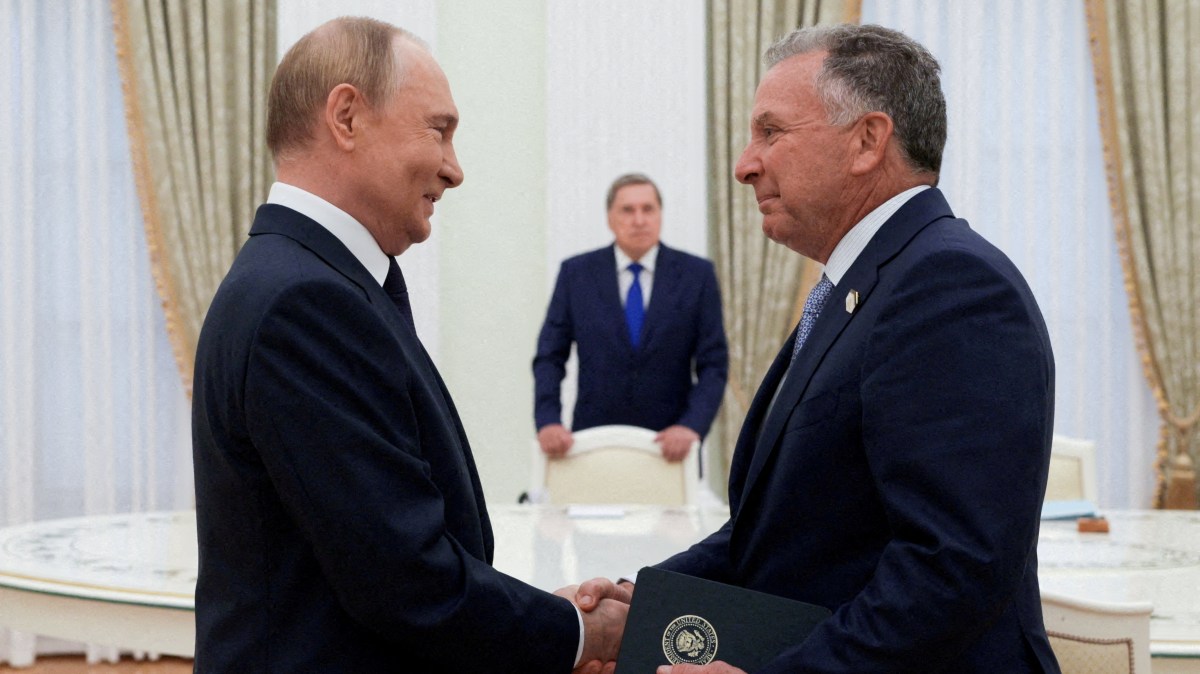Russia and the United States have discussed Israel’s occupation of the West Bank as a model for ending the war in Ukraine, The Times has been told.
Under this scenario Russia would have military and economic control of occupied Ukraine under its own governing body, imitating Israel’s de facto rule of Palestinian territory seized from Jordan in 1967.
The idea was raised weeks ago in discussions between Steve Witkoff, President Trump’s peace envoy, and his Russian counterparts, according to a source close to the US national security council.
Witkoff, who is also tasked by Trump with bringing peace to the Middle East, is understood to support the idea, which the Americans believe circumvents barriers in the Ukrainian constitution to ceding territory without holding an “all-Ukraine” referendum.
President Zelensky has refused to countenance handing over land but the occupation model may be a mechanism to allow for a truce after three and a half years of war.
Under the model, Ukraine’s borders would not change, just as the borders of the West Bank have remained the same for 58 years, only under Israeli control.
The White House has been asked for comment.
“It’ll just be like Israel occupies the West Bank,” the source said before Trump’s summit with President Putin in Alaska on Friday. “With a governor, with an economic situation that goes into Russia, not Ukraine. But it’ll still be Ukraine, because … Ukraine will never give up its sovereignty. But the reality is it’ll be occupied territory and the model is Palestine.”
President Zelensky of Ukraine in the Kharkiv region this month
AFP
Israel’s occupation has been ruled illegal by the International Court of Justice, which is not recognised by the US and only partially accepted by Russia. In March 2022 the court ordered Russia to “immediately suspend military operations” in Ukraine, by a vote of 13 to two in which the Russian and Chinese judges were opposed. The order is binding on Russia but the court has no means to enforce it.
The United Nations has ordered Israel to end its occupation, most recently in a vote of the general assembly last September by 124 nations to 14, with 43 abstentions.
The resolution called for Israel to comply with international law within 12 months and withdraw its military forces, immediately cease all new settlement activity, evacuate all settlers from occupied land and dismantle parts of the separation wall it constructed inside the occupied West Bank. Israel, which voted against the measure along with the US, has ignored the resolution, on which Britain abstained.
This outcome for Ukraine’s occupied territories is seen by some US negotiators as simply reflecting the reality of the war and the refusal by all other nations to become directly involved in fighting Russia. In this view, all that remains is to establish the exact boundaries of Russian occupation, which Putin is seeking to push as far as possible before his talks with Trump in Alaska.
The scenario would reflect the US foreign policy world view as expressed by Sebastian Gorka, Trump’s senior director for counterterrorism, in an interview in May.
“We live in the real world. The Trump administration lives in the real world,” Gorka told Politico. “We recognise the reality on the ground. Number one, that’s the beginning because we’re not utopianists and we’re not human engineers. We’re not some kind of pie in the sky believers in utopia.
“We recognise the reality on the ground and we have one priority above all else, whether it’s the Middle East or whether it’s Ukraine. It’s to stop the bloodshed. Everything else comes after the bloodshed has been halted.”
Israeli soldiers raid the Balata refugee camp east of Nablus in the West Bank this month
JAAFAR ASHTIYEH/AFP/GETTY IMAGES
It remains to be seen just how far the imitation of the West Bank situation would go if the plan is put into effect, since this is a model that has been a basis for discussion on ending the bloodshed and will not replicate factors unique to the West Bank.
Israel’s occupation has been widely criticised for establishing settlements, seizing land ownership and imposing a two-tier system of citizenship: Israeli civilians living or passing through the West Bank are subject to Israeli law while Palestinian civilians are subject to martial law and not permitted to vote in Israel’s national elections.
• Not a subscriber? Sign up for more exclusive reporting and expert analysis from The Times


